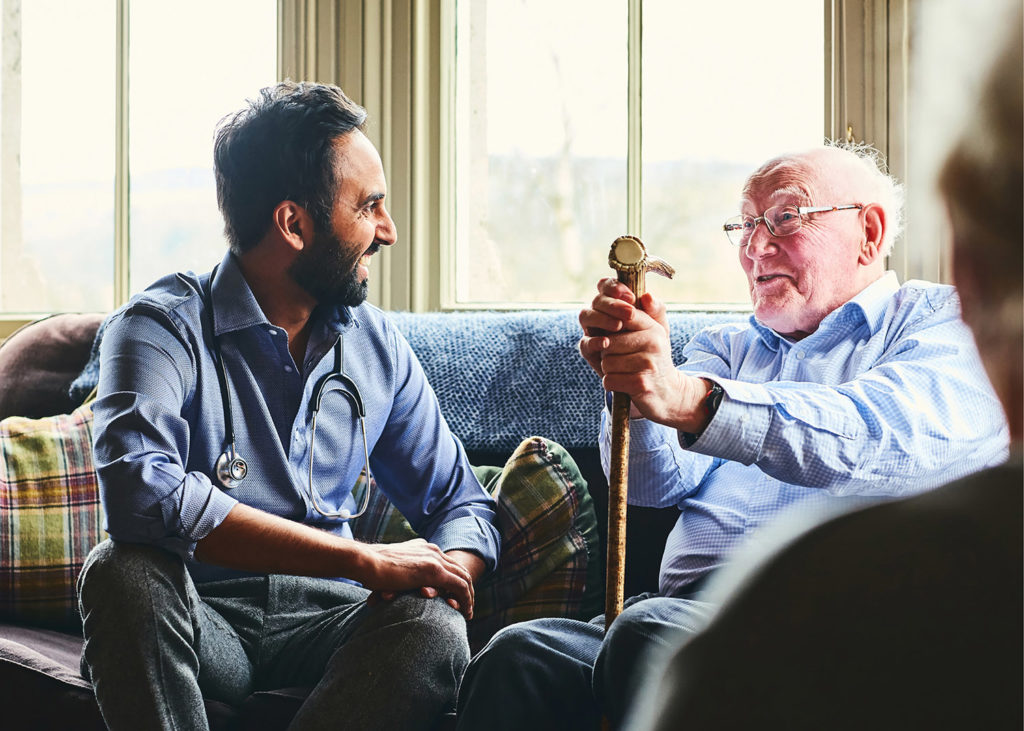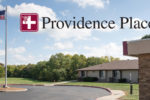Guidance to Help Families and the Community Navigate End of Life

Story by Sarah Ruttle
The distinction between support and guidance is nuanced and important to the way we as humans navigate complex and challenging situations throughout our lives. A support network of professional colleagues, peers, generations of family members, and other interpersonal relationships is critical to our ability to manage changes in life, find work-life balance, cope with stress and emotions, and recover from loss. In addition to support, we also need sources of guidance to help steer us through life. Guidance from others helps us respond to challenging situations, solving problems, making critical choices and being reassured in those choices, and knowing when to adjust or stay the course when faced with the unexpected.
In many ways, guidance goes beyond listening and support but is not merely the provision of solutions. It’s something that’s done in cooperation with the recipient. It’s unique to the individual; the guidance you provide to your aunt at the end of her career compared to your niece at the beginning of hers likely looks very different. Guidance is also a process that is continually adjusted as situations evolve. It doesn’t necessarily provide distinct directives; rather, it equips us with trusted information that can be translated into actionable choices that meaningfully impact our lives. Even who we seek guidance from is one of the many instances of the fluid nature of guidance. Whether offering guidance personally or professionally, we must be adaptable to the changing situation, and responsive to the unique needs and wants of the recipient.

Adaptable guidance in times of need
 When making decisions that impact our health and quality of life, guidance from many different resources becomes critically important. While the medical science behind disease processes and prognoses is typically top-of-mind for most people, health does not exclusively reside in the physical. Our quality of life, emotional and mental well-being, spiritual beliefs, and personal wishes all play an important role in our overall health and our healthcare outcomes. Guidance offered in healthcare decision-making should always place a priority on choices. It’s the reason this emphasis is reflected as one of the eight Guiding Principles of Kansas City Hospice & Palliative Care (KCH). At KCH we honor a person’s right to make their own choices, including the right to choose hospice and palliative care and to make treatment decisions based on personal values. When faced with serious illness or end of life, the focus is less on length of life, finding a cure, or preventing death; rather, a priority is placed on quality of life and achieving pain and symptom management to allow patients to enjoy their remaining time with loved ones. As with choices at other stages of life, personal goals and wishes are important considerations when offering guidance to patients related to palliative care and hospice options.
When making decisions that impact our health and quality of life, guidance from many different resources becomes critically important. While the medical science behind disease processes and prognoses is typically top-of-mind for most people, health does not exclusively reside in the physical. Our quality of life, emotional and mental well-being, spiritual beliefs, and personal wishes all play an important role in our overall health and our healthcare outcomes. Guidance offered in healthcare decision-making should always place a priority on choices. It’s the reason this emphasis is reflected as one of the eight Guiding Principles of Kansas City Hospice & Palliative Care (KCH). At KCH we honor a person’s right to make their own choices, including the right to choose hospice and palliative care and to make treatment decisions based on personal values. When faced with serious illness or end of life, the focus is less on length of life, finding a cure, or preventing death; rather, a priority is placed on quality of life and achieving pain and symptom management to allow patients to enjoy their remaining time with loved ones. As with choices at other stages of life, personal goals and wishes are important considerations when offering guidance to patients related to palliative care and hospice options.
Once a patient and family decide palliative care or hospice is the right choice, each member of the interdisciplinary team is able to offer guidance as expert professionals in their respective fields. In most situations, this professional guidance is offered to family members to help them in their caregiving journey. Commonly, it includes providing educational resources for infection control in the home or pain management. While hospice staff caregivers are available 24/7, they are not physically present around the clock in the home, so equipping family members to be successful in their caregiving with education and resources is an important component of hospice care. This guidance is also given to assist the family in ensuring goals and wishes expressed by their loved ones are fulfilled, which can ease the emotional burden of caregiving and help family members feel resolved and unquestioning once their loved one has died. Anticipatory grief support and guidance in saying goodbye and preparing for death are also important components of hospice care.
 At Kansas City Hospice, we help families connect to other community resources for needed support and offer education and guidance to not only patients and families, but the wider community, about advanced care planning and establishing healthcare directives for yourself and communicating this to your loved ones. We also provide guidance for both families and medical professionals about how to broach difficult conversations about healthcare choices for serious illnesses.
At Kansas City Hospice, we help families connect to other community resources for needed support and offer education and guidance to not only patients and families, but the wider community, about advanced care planning and establishing healthcare directives for yourself and communicating this to your loved ones. We also provide guidance for both families and medical professionals about how to broach difficult conversations about healthcare choices for serious illnesses.
Responding as a local community leader
 While guidance and education for patients and their families is central to quality palliative and hospice care, of equal importance to community healthcare leaders is the professional guidance provided by experts in the field, like Kansas City Hospice & Palliative Care. We are able to provide presentations to local healthcare providers and other businesses, with topics ranging from available services and the referral process to end-of-life topics including grief support in the workplace. We also offer continuing education for medical professionals and other community education more broadly applicable to the wider community.
While guidance and education for patients and their families is central to quality palliative and hospice care, of equal importance to community healthcare leaders is the professional guidance provided by experts in the field, like Kansas City Hospice & Palliative Care. We are able to provide presentations to local healthcare providers and other businesses, with topics ranging from available services and the referral process to end-of-life topics including grief support in the workplace. We also offer continuing education for medical professionals and other community education more broadly applicable to the wider community.
We are proud to be seen among our healthcare partners, which include North Kansas City Hospital, Kansas University Medical Center, and AdventHealth Shawnee Mission, as a credible source of factual information on end-of-life issues and a place partners turn for guidance when challenging situations with their patients arise. These partnerships ensure a coordinated continuum of healthcare for our local community, an available and accessible range of resources appropriate to varying end-of-life patient needs, and a timely and efficient referral process.
Advancement through collaboration
Our partnerships also ensure challenges to this continuum are identified and resolved. One example which comes to mind is a recent expansion of our partnership with North Kansas City Hospital (NKCH), who identified a need for grief support and resources for families whose loved ones died while receiving care at NKCH but who may have not been receiving hospice care. This partnership ensures these families, who would not have been referred to KCH grief support through existing channels, don’t fall through the cracks and receive the specialized care they need to heal, address loss-related trauma, and prevent untreated grief from escalating into more complicated symptoms.
Along with Children’s Mercy, North Kansas City Hospital, and University of Kansas Hospital, Kansas City Hospice is proud to be among University Of Kansas Medical Center’s four partners in the KU Hospice & Palliative Care Medicine Fellowship. This collaboration combines experts across disciplines to form a robust interdisciplinary team of educators to guide medical fellows in their education and experience to become the next generation of highly skilled providers in palliative medicine, including hospice. As the needs of the local community evolve, so too must the systems and services to meet these needs. Coordinated education through the Palliative Care Medicine Fellowship program is a reflection of this. Partnership and collaboration advances healthcare in a way that ensures the adaptable and responsive climate needed to provide patients and families with skilled care, a supportive team, and the guidance to empower them in their care.






